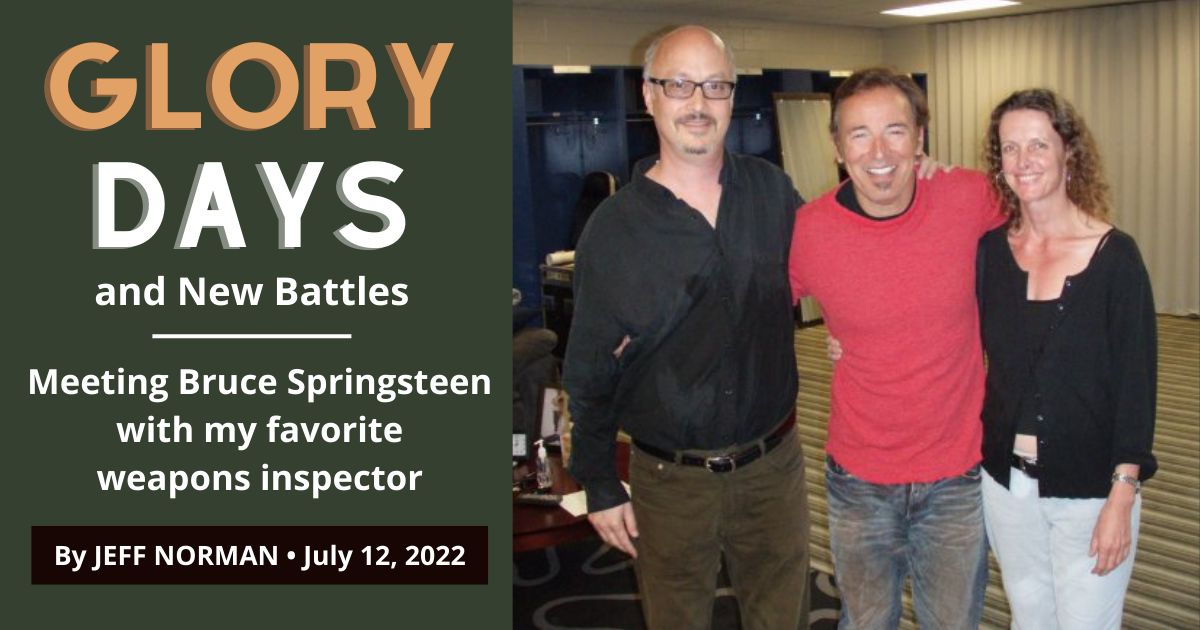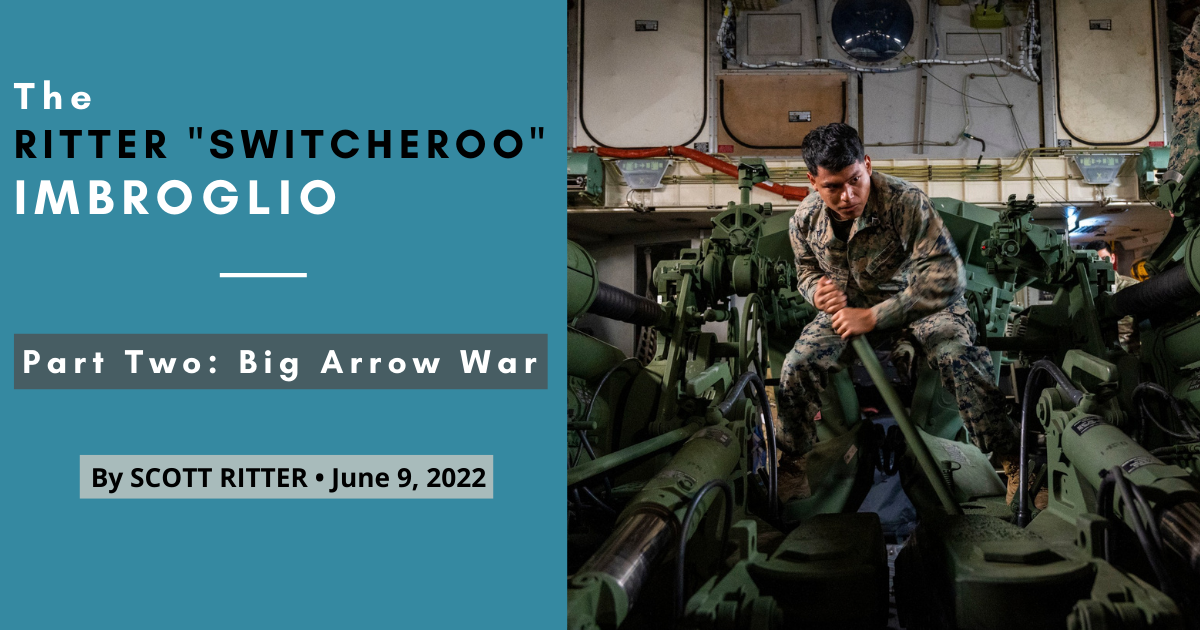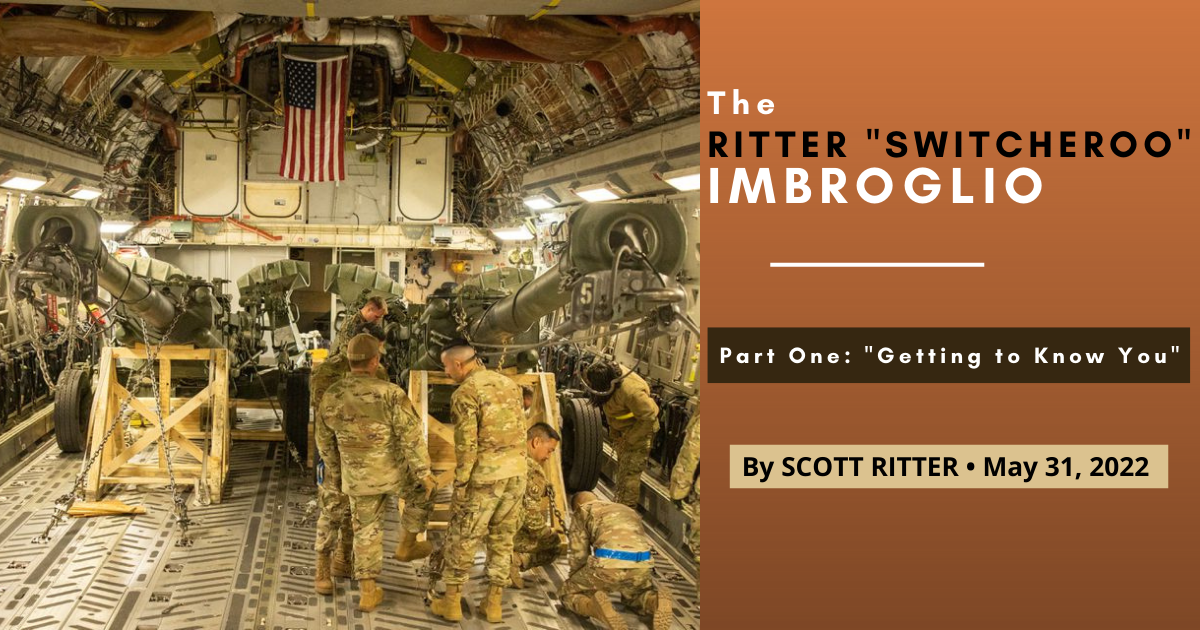|
In August of 2008 I was on the road in New England with Scott Ritter and my then-girlfriend. One of the highlights for me was a backstage confab we had with Bruce Springsteen. It happened because I contacted Springsteen's management to request a meeting after I found out the Boss was a Ritter fan. I had organized several speaking engagements for Scott in the area, and noticed our paths would cross Springsteen's when he was scheduled to perform at Gillette Stadium in Foxboro, MA.
At the time, Scott was the most credible critic of the Iraq war, and the hottest speaker on the so-called antiwar circuit, which in reality might have been more of an anti-Bush movement. We thought Springsteen was likely to support our efforts, and indeed we were soon granted permission to use his "Land of Hope and Dreams" in a video campaign.
The concert was memorable for another reason as well. It had been delayed almost two hours due to a severe thunder and lightning storm that left us drenched and disheveled by the time we made our way to the backstage area. As soon as he laid eyes on Scott, Springsteen declared ceremoniously, "Ah, the man himself!"
When Scott and I reminsce about that New England road trip, it is more often about our police encounter than it is about the Springsteen experience. I was pulled over for not having my headlights on in the early evening. When the cop asked me where we were going, I answered incorrectly. Scott initially thought I had intentionally lied, but actually I was in unfamiliar territory and had merely forgotten the name of a town. Scott insisted that lying to a police officer is inherently illegal, to which I replied that only a material lie pertaining to a criminal investigation or crime report would be unlawful. If I were to say to the nice officer that I prefer the Rolling Stones to the Beatles when the moptops from Liverpool are really my favorite group, I'd be breaking no law by telling that immaterial lie. Likewise, my failure to turn on headlights created no obligation to inform the cop of our destination.
The disagreement was a bit unusual for our relationship, because the focus of our activities tended to be on geopolitical matters, and I generally had no basis for disputing what Scott said in his area of expertise. But I felt confident about this legal issue, and we argued about it intermittently for months, because Scott wouldn't admit I was right, until eventually, begrudgingly he did. Fourteen years later the same dynamic arose in our podcast when Scott railed against Supreme Court justices for what he sees as perjury worthy of impeachment. Again, he is wrong, and again he is reluctant to admit it. My goal now is to get him to fess up more readily than he did back in the day. Also, I will say here what I was unable to say in the podcast about the Supreme Court's recent abortion decision (Dobbs v. Jackson Women's Health Organization), due to Scott's unwillingness to relinquish his mantra about "settled law." He told me adamantly, "I don't care about anything else."
Actually, it's neither unusual nor improper for a Supreme Court justice to reject "settled law" when they believe the original reasoning is flawed, even if there's no fresh argument. As pro-choice law professor Ilya Somin wrote in a 2018 blog post: "The truth is that 'settled law' is just a euphemism that jurists and legal scholars use to refer to Supreme Court precedent that is indeed binding - but only until a majority of the justices decide that it should be overruled."
Moreover, the senators who confirmed Brett Kavanaugh were aware he wrote in a 2003 email: "I am not sure that all legal scholars refer to Roe as the settled law of the land at the Supreme Court level since [the] Court can always overrule its precedent, and three current Justices on the Court would do so."
We don't need to guess what Kavanaugh meant, because Sen. Dianne Feinstein probed him about it extensively during his senate confirmation hearing. Kavanaugh explained why he thinks it's accurate to call Roe v. Wade settled law, and that he was simply pointing out in the email how others feel differently about it. Feinstein asked him twice if he thinks Roe - the particular settled law they were discussing - was decided correctly. Kavanaugh refused to answer that question both times. When Feinstein pressed him, he told her he feels compelled to honor the precedent established and upheld by previous nominees who never answer that type of question in a confirmation hearing. Precisely how I explained it in the podcast.
Regardless of what settled law means to Scott, it's clear Kavanaugh believes Supreme Court decisions can "always" be reversed, and that his belief was no secret at the time of his confirmation hearing. The tone and content of the questioning clearly indicate the senator and nominee think of settled law as Prof. Somin - and legal scholars in general - do. If Feinstein and her colleagues had understood settled law to mean what Scott insists it means, there would have been no need to ask Kavanaugh if Roe was decided correctly, and no need for him to evade the question.
Yale professor Akhil Amar, a self-described "Democrat who supports abortion rights but opposes Roe," contends in a May 14 Wall Street Journal essay that "an essential function of the Court is to revise incorrect or outdated prior rulings," and there is "nothing radical, illegitimate or improperly political" about Justice Alito's leaked draft opinion that is now officially settled law. In Smith v. Allwright (1944), Justice Stanley Reed wrote for the majority: "When convinced of former error, this Court has never felt constrained to follow precedents." In Patterson v. McLean Credit Union (1989), Justice Anthony Kennedy wrote for the Court: "Our precedents are not sacrosanct, for we have overruled prior decisions where the necessity and propriety of doing so has been established." Indeed, the Supreme Court has overruled its own precedents over 200 times, according to the Library of Congress. When I referred to the consensus among legal experts during our podcast, Scott claimed it doesn't matter what experts say, because "the Constitution belongs to the People, and I am the People." But since legal experts are just as much "the People" as he is, it does not seem to me that Scott articulated any logical reason for dismissing their analysis. Yet dismiss it he did. It is not just Scott but many others who have reacted to the Dobbs decision with misdirected rage. I don't object to abortion remaining lawful and available, but the way pro-choice advocates have behaved (threatening and harassing the justices) is sickening, and Scott should not fuel their toxic mindset with his own false accusations of judicial malfeasance. It's a fact the Constitution contains no mention of abortion. Therefore, the Dobbs decision is at least arguably correct. The majority justices might be wrong, but it is not obvious they are wrong, and it is certainly not the Court's role to solve societal problems by creating constitutional rights when they don't believe such rights already exist. It is up to legislators.
Comments
If you haven’t done a schedule of fires for at least three artillery battalions in the field using live rounds while maneuvering, I’m probably not interested in your military opinion about Ukraine. The above tweet was written three days before Russia initiated its “Special Military Operation” in Ukraine. The specific targets for this tweet were the multitudes of former “special forces” types (I put that in quotations, because on Twitter, one can take nothing for granted) who were opining about the Russian military, drawing upon their own (alleged/assumed/manufactured/genuine) military service, all of which, if it indeed occurred, was spent chasing goat herders, farmers, and wedding parties around Iraq and Afghanistan.
These so-called “operators,” whose time in service ranged from zero to twenty years, had never trained to fight the Russian threat, knew nothing about large-scale ground combat or maneuver warfare, and had never experienced sustained combat larger than a platoon-sized firefight. For them, fire support came in the form of helicopters, A-10’s and fast-attack aircraft which operated free from worry of any modern integrated air defense system. Artillery or heavy mortar support was delivered, when available, from fixed fire support bases, without fear of any meaningful counterbattery fires. Their ”war” was fought on their timetable, against a lightly-armed enemy, usually at night, where they US forces enjoyed the advantages of night-vision technology. Intelligence information was derived from a collection plan which made use of the best technology, and communications whose only limitations were derived from the mistakes made by the operators themselves. These elite warriors staged from air-conditioned bases where they had access to hot food, showers and other peace-time amenities, including internet connectivity and video games. They earned medals for heroism by the fistful, some of them justified, many of them not. They spent two decades losing two conflicts against an enemy whose only advantage was local knowledge and tenacity. They never faced a modern foe capable of contesting every aspect of a battle space these operators assumed would be dominated by their own side. They never were bombed by enemy aircraft, shelled by massed artillery fires, confronted by tanks, and armored fighting vehicles in significant numbers, or had their communications jammed by hostile forces. In short, they had never been to war—not the kind that was shaping up to be waged in Ukraine. In the first of a two-part series about the controversy surrounding his "turnaround" on the Ukraine-Russia conflict, Scott Ritter recounts his background and experience. In the second installment, he'll address the specifics of his evolving analysis in light of US military assistance provided to Ukraine. Ritter has probably been the most outspoken proponent of the ‘Russia is winning’ theory, a hypothesis that runs counter to everything we read in the legacy media or see on the cable news channels. Unfortunately, Ritter’s views on the matter have changed dramatically, and that’s due almost entirely to developments on the ground. As Ritter candidly admits, ‘The military aid the west is providing to Ukraine is changing the dynamic and if Russia doesn’t find a way to address this meaningfully…the conflict will never end.’ The above passage is taken from an article, “Scott Ritter's Switcheroo: ‘Why I Radically Changed My Overall Assessment’”, published on May 18 of this year. It was written by Michael Whitney, a self-described “geopolitical and social analyst” based in Washington State. Mr. Whitney has had a 20-year career as “an independent citizen-journalist” during which time he purports to have committed himself to “honest journalism, social justice and world peace.”
I have no reason to doubt any of Mr. Whitney’s biographical data. I do, however, take umbrage at someone who claims a two-decade-long career in journalism to have written an article where I factor in as the central character without contacting me during the article's preparation for comment. I think Mr. Whitney and I have a difference of opinion on what constitutes “honest journalism.” Had he done so, he might have been able to provide an adequate answer to the question he poses at the end of the above-quoted passage: “So, what changed? What are the so-called developments that led to Ritter’s volte-face?” Moreover—and perhaps more importantly—he might have been better-positioned to find out who I was, what aspects of my résumé might be conducive to the problem at hand, and what my motivations were and are. To better respond to Mr. Whitney’s article, therefore, I will take it upon myself to do his job for him and proceed with a process I’ll call “getting to know you.” Whenever I am asked to appear on a podcast or to be the subject of an interview, I am asked what title I would like attached to my name. While I am perhaps best known for my role as a UN weapons inspector in Iraq from 1991-1998 (and invariably this biographical highlight finds its way into my description), the label that I promote is that of “former Marine Corps Intelligence Officer.” The reality is that it was my time in the Marine Corps which defines me more than any other (my UN weapons inspector experience was little more than a continuation of my Marine Corps experience.) |
AuthorScott Ritter is a former US Marine Corps intelligence officer whose service over a 20-plus-year career included tours of duty in the former Soviet Union implementing arms control agreements, serving on the staff of US Gen. Norman Schwarzkopf during the Gulf War and later as a chief weapons inspector with the UN in Iraq from 1991-98. His new book is Disarmament in the Time of Perestroika: Arms Control and the End of the Soviet Union. ArchivesCategories |




 RSS Feed
RSS Feed